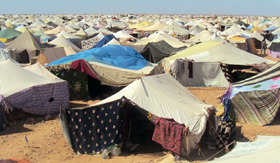 The Sahrawi are the native people of the Western Sahara. Most of them live in the part of the Sahara occupied by Morocco, while the others live in free territories or exiled to refugee camps in the province of Tindouf, in Algeria. There is another big group of Sahrawi people who are living in exile in Spain, France, Mauritania and other countries. Their native language is a dialect, Hassaniya, a variation from Classic Arabic, and they also speak Spanish.
The Sahrawi are the native people of the Western Sahara. Most of them live in the part of the Sahara occupied by Morocco, while the others live in free territories or exiled to refugee camps in the province of Tindouf, in Algeria. There is another big group of Sahrawi people who are living in exile in Spain, France, Mauritania and other countries. Their native language is a dialect, Hassaniya, a variation from Classic Arabic, and they also speak Spanish.
The Western Sahara was a Spanish colony from 1884 until 1976, when it was annexed by Morocco in what was called the Green March, in response to Spain’s inaction. At the same time, the Polisario Front proclaimed the Sahrawi Arab Democratic Republic (SADR), to fight for their freedom and independence. They are some 300,000 people, and currently, more than one third of the population lives in refugee camps under very bad conditions, helped by the UN, ACNUR and volunteers and organizations from Spain and other countries. Their country is rich in phosphates and has one of the most important fishing banks in the world. Nonetheless, this economic wealth coveted by Morocco, the geopolitical factors of their land and international interests with the Alawite kingdom make it very difficult to find a democratic and fair resolution to the problem.
Their fight for independence has brought on serious repression from Morocco that could be considered genocide: from getting bombarded with white phosphorous, to continuous Moroccan military and police action, and even including the incentivized mass-moving of Moroccans (and Mauritians) to the occupied zones with the goal of making the Sahrawi the minority in their own country, where they are clearly discriminated against. The UN insists on having a self-determination referendum, which Morocco refuses to allow, in addition to refusing to let foreigners come to the territory.
Any type of protest is harshly suppressed and those who try to participate in them have a serious risk of ending up in prison or tortured. They set up all different types of obstacles to prevent the international community from observing the trials against the Sahrawi people, which also lack any fair trial guarantees.
You could say that both in 1976 and now the Spanish governments have wanted to brush aside the Western Sahara issue and has wanted to leave the people up to their own destiny, contrary to what a large part of the Spanish society wants, who have always been with the Sahrawi people, which is evidenced in the agreements between sister cities and towns or the work done with kids from the Sahara region.
LIBERPRESS CATALUNYA AWARD 2019
The SAHRAWI PEOPLE receive the LIBERPRESS CATALUNYA AWARD 2019 for their brave fight for freedom and independence for the Western Sahara, for the enormous sacrifice and suffering on behalf of their women and men, for their leaders’ dedication, and especially in remembrance of all the Sahrawi that were killed, tortured and imprisoned for demanding Morocco to leave their territory and defending their legitimate right to self-determination.


